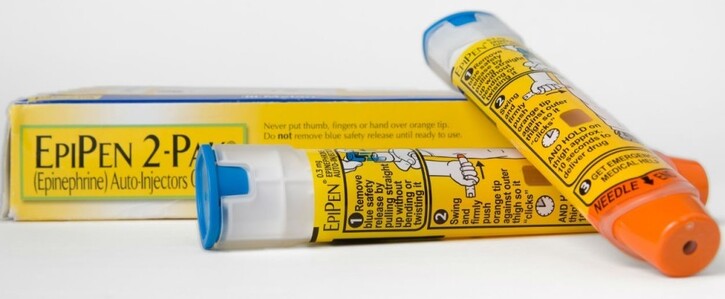100 signatures reached
To: UK Secretary of State Jeremy Hunt and Foreign Secretary Boris Johnson
EpiPens

Persuade the US Government to take concrete action on the price of EpiPens
Why is this important?
Many people now have severe allergies, and exposure to the allergen can cause violent anaphylactic shock which, if untreated rapidly, can lead to death very quickly.
EpiPens, injectors of adrenaline, usually in 0.3mg doses, manufactured in the USA by Mylan, a subsidiary of Pfizer, have had their price "hiked" by the manufacturers by over 500% since 2007. They have reduced production significantly as other manufacturers (Bausch+Lomb, maker of Emerade, and ALKAbelló, maker of Jext) cannot make up the shortage. With the increased demand, they are experiencing difficulty stabilising the adrenaline for the injectors.
Many people with severe allergies are having significant problems getting adrenaline injectors from pharmacies. The Jext are prescribed more than EpiPens largely because of the price hike by Mylan, whose disgraceful action on a drug device without which people with, for example, a severe nut allergy, could die within minutes appears to cause them no guilt whatsoever.
ith the increased demand, they are experiencing difficulty stabilising the adrenaline for the injectors.
Pharmacies in the UK are being limited to ordering only two per day. Many users, particularly children need several injectors on prescription and cannot get them.
Mylan, manufacturers of Epi-pens have fleeced their vulnerable customers, playing Russian Roulette with their lives. Despite pressure from US government, they haven't reduced the price. All they have done is to play public relations with offers which are meaningless and cost them little. Mylan increased financial assistance available for some patients to purchase EpiPens, a gesture that was called a "classic public relations move" by Harvard Medical School professor Aaron Kesselheim. The up to $300 saving cards can only be used by a small number of people who need the drug, and no one on Medicaid. They do nothing about the high price which is still being paid by insurers, who ultimately pass the cost onto consumers.
In September 2016, the New York State Attorney General began an investigation into Mylan's EpiPen4Schools program in New York to determine if the program's contracts violated antitrust law[91] and the West Virginia State Attorney General opened an investigation into whether Mylan had given the state the correct discount under the Medicaid Drug Rebate Program and subpoenaed the company when it refused to provide the documentation the state requested.
In October 2016 the CEO of Mylan testified to Congress that Pfizer/King charged Mylan about $34.50 for one device. In September 2016, a Silicon Valley engineering consultancy performed a teardown analysis of the EpiPen and estimated the manufacturing and packaging costs at about $10 for a two-pack.
In the meantime, a world-wide shortage of adrenaline auto-injectors is causing untold worry to anyone vulnerable to anaphylaxis.
The UK Government must ask the US Department of Health to force Mylan to reduce their prices to pre-2007 levels and increase their production to its former rate.
EpiPens, injectors of adrenaline, usually in 0.3mg doses, manufactured in the USA by Mylan, a subsidiary of Pfizer, have had their price "hiked" by the manufacturers by over 500% since 2007. They have reduced production significantly as other manufacturers (Bausch+Lomb, maker of Emerade, and ALKAbelló, maker of Jext) cannot make up the shortage. With the increased demand, they are experiencing difficulty stabilising the adrenaline for the injectors.
Many people with severe allergies are having significant problems getting adrenaline injectors from pharmacies. The Jext are prescribed more than EpiPens largely because of the price hike by Mylan, whose disgraceful action on a drug device without which people with, for example, a severe nut allergy, could die within minutes appears to cause them no guilt whatsoever.
ith the increased demand, they are experiencing difficulty stabilising the adrenaline for the injectors.
Pharmacies in the UK are being limited to ordering only two per day. Many users, particularly children need several injectors on prescription and cannot get them.
Mylan, manufacturers of Epi-pens have fleeced their vulnerable customers, playing Russian Roulette with their lives. Despite pressure from US government, they haven't reduced the price. All they have done is to play public relations with offers which are meaningless and cost them little. Mylan increased financial assistance available for some patients to purchase EpiPens, a gesture that was called a "classic public relations move" by Harvard Medical School professor Aaron Kesselheim. The up to $300 saving cards can only be used by a small number of people who need the drug, and no one on Medicaid. They do nothing about the high price which is still being paid by insurers, who ultimately pass the cost onto consumers.
In September 2016, the New York State Attorney General began an investigation into Mylan's EpiPen4Schools program in New York to determine if the program's contracts violated antitrust law[91] and the West Virginia State Attorney General opened an investigation into whether Mylan had given the state the correct discount under the Medicaid Drug Rebate Program and subpoenaed the company when it refused to provide the documentation the state requested.
In October 2016 the CEO of Mylan testified to Congress that Pfizer/King charged Mylan about $34.50 for one device. In September 2016, a Silicon Valley engineering consultancy performed a teardown analysis of the EpiPen and estimated the manufacturing and packaging costs at about $10 for a two-pack.
In the meantime, a world-wide shortage of adrenaline auto-injectors is causing untold worry to anyone vulnerable to anaphylaxis.
The UK Government must ask the US Department of Health to force Mylan to reduce their prices to pre-2007 levels and increase their production to its former rate.
